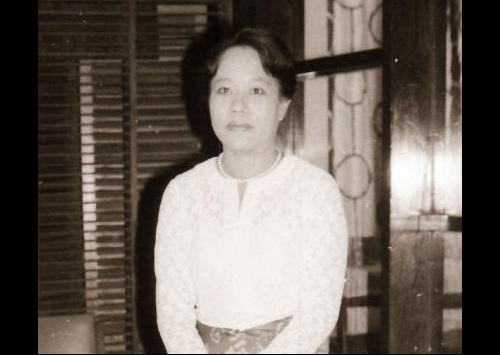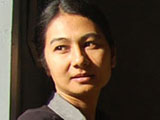San San Nweh: An Old Friend and A Prolific Writer
by Khet Mar / October 4, 2012 / No comments
When will be the right time to publish her story?

San San Newh. Photo provided by the author.
Between the late 1980s and 1990s there was an annual gathering of writers, poets, and artists in Burma. The event took place on the birthday of Ludu Daw Ah Mar, a well-known and respected Burmese writer, and was celebrated at a monastery near Taugthaman lake. Everybody was excited to go because they knew that they’d meet many people there.

- In Burma if you want to hear about issues the newspapers can’t talk about, you should go to a tea shop. Tea houses were where I used to meet with other activists, writers and artists, as well as where I built friendships. Within tea houses we talked about Burmese writers, literary trends we noticed, and, of course, politics. This online space attempts to emulate the conversations I enjoyed in Rangoon’s tea houses.

- Khet Mar is a journalist, novelist, short story writer, poet, and essayist from Burma. She is the author of one novel, Wild Snowy Night, as well as several collections of short stories, essays and poems. Her work has been translated into English and Japanese, been broadcast on radio, and made into a film. She is a former writer-in-residence at City of Asylum/Pittsburgh.
In mid-November of 1993, a group of female writers, including myself, marched in to some magazine offices in downtown Yangon to raise funds to go to Daw Ah Mar’s birthday party. The leader of this group was Daw San San Nweh. When we talked to the editors about our plan, they were happy to see our excitement about the trip and each donated some money.
On November 27, 1993, we met at the main train station. The crowd grew as it got closer to departure time. Half an hour before the train was scheduled to leave a friend of ours arrived with bad news: “Daw San San Nweh was taken by Military Intelligence this morning! As usual, no one knows how many days or months she has to stay in the interrogation camp, or whether she has been sentenced or not.”
Just like that our happiness and excitement about the trip was gone.
When I phoned Daw San San Nweh in mid-September of this year, we talked about our past experiences, including the Mandalay trip that she could not join.
“I was very excited for that trip,” she said. “I was depressed when the Military Intelligence took me. It was the ninth time I was detained.”
Although we laughed as we talked on the phone, we had faced that time with anger and sadness.
By the time she was 15 years old San San Nweh had become a correspondent for three different national newspapers. She edited two magazines and was also very politically active in Nobel Peace Prize winner Aung San Suu Kyi’s National League for Democracy.
After she was arrested in 1994, she was found guilty of “publishing information harmful to the state” and sentenced to seven years imprisonment, with an additional three years for “giving biased viewpoints” to French journalists. As a result, she suffered the long-term effects of imprisonment in harsh conditions and torture at Insein prison. Additionally, San San Nweh’s mother was the only person able to support her, because her husband had died after she was detained the first time (for ten months in 1989), and San San Nweh’s elder daughter had been imprisoned along with her.
Still, San San Nweh has found fame in Burma and beyond: She has published 12 novels, over 500 short stories, and over 100 poems since 1974. In 1999, she won the Reporters Without Borders Fondation de France Prize and two years later she and U Win Tin won the World Association of Newspapers’ Golden Pen of Freedom.
Recently San San Nweh told me that she is editing a novel. She wrote it with living characters and the background spans Burma from the 1960s to now. Since it is based on true events she is waiting for a suitable time to publish.
I lived through the period that her historical novel was written about and I very much want to read it. Nevertheless, I understand the delay; I myself had to wait for the right time to publish stories because I wrote about real events, using living characters. After talking with San San Nweh, I wonder if there are other foreign writers waiting for a suitable time to publish stories about real events and characters. Certainly there are some writers still waiting for a suitable time to publish their novels in Burma.
Translation: Courtney Wittekind




